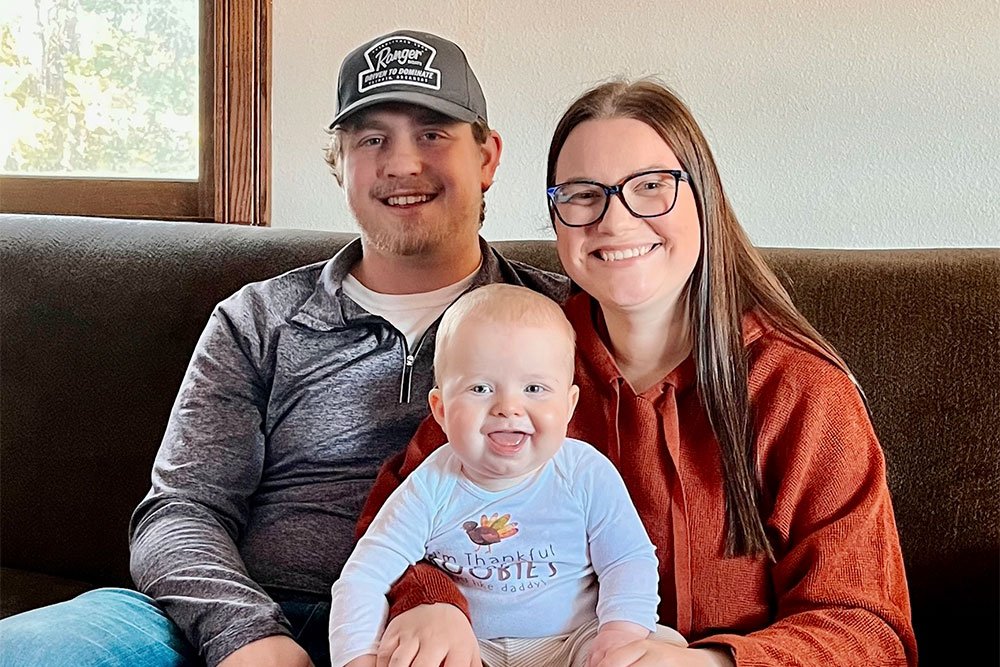Congenital Heart Defects: A Mother's Journey
 When it comes to matters of the heart, no one knows better than Brittany Freese. As a registered pediatric and adult echocardiograph (echo) technician for CentraCare Heart & Vascular Center (CCHVC), she spends her days scanning hearts looking for defects and abnormalities in everyone from newborns to adults.
When it comes to matters of the heart, no one knows better than Brittany Freese. As a registered pediatric and adult echocardiograph (echo) technician for CentraCare Heart & Vascular Center (CCHVC), she spends her days scanning hearts looking for defects and abnormalities in everyone from newborns to adults.
"I make sure the heart looks normal. In pediatrics, we see many kids born with congenital heart defects (CHD)," Brittany noted.
According to the Centers for Disease Control & Prevention (CDC), nearly 1% of babies born in the United States each year have CHD.
"When you think about how many babies are born in a day, CHD is really common," Brittany affirmed.
Brittany's 1-year-old son, Walker, happened to be one of those babies.
In 2021, Brittany and her husband attended their son's 20-week prenatal ultrasound.
"The scan was going great, and everything was fine. Then, the ultrasound technician started looking at the heart," Brittany recalled.
That's when she noticed the room go silent. "I had a feeling something was wrong. The doctor came in and it was a downward spiral from there."
Brittany was referred to Nicholas Zaban, MD, at the pediatric cardiology program at CCHVC where Brittany works. "I see a wide range of patients from babies before they are born to adults," said Dr. Zaban. "My job is to answer questions as best as I can, offer as much guidance as possible and relieve anxiety. Brittany was in a unique situation because she already knew a lot about CHD as a pediatric sonographer, but then learned a whole lot more about CHD as a parent."
At 20 weeks gestation, the heart is so little that it's hard to tell if a baby has CHD or if it is just a series of bad photos. Brittany's care team scanned her baby's heart again at 24 weeks gestation and they were confident her son's aorta was smaller than it should be.
"To hear something was wrong with my baby and not knowing what the future would look like was hard. When you find out you're pregnant, you start dreaming of the future and making plans. Knowing the plans I wanted to make wouldn't necessarily be possible was a tough pill to swallow," said Brittany.
Brittany found comfort in knowing she and her baby were going to be getting the best care from people she trusted and worked side by side with every day.
It made me feel 100% better. I work with two amazing pediatric cardiologists. I'd seen them take great care of patients every day. I had zero reservations and went into it with the mindset of whatever they said, I was going to agree with because I trust them.
— Brittany Freese, Registered pediatric and adult echocardiograph technician
"We can diagnose a lot of things before a baby is born, but a lot of times we can't really get all the details until the child is born. That's what we had to do in Brittany's case," recalled Dr. Zaban.
Brittany gave birth to Walker on February 7, 2022. The next day an overnight nurse took his vitals and the blood pressure in his arm wasn't aligning with the pressure in his leg.
"That's not generally a good sign, so they took him over to the St. Cloud Hospital Neonatal Intensive Care Unit (NICU). After undergoing an echo that day, they confirmed everything that we had suspected," Brittany remembered.
Walker had coarctation of his aorta. Cardiologists found two additional heart abnormalities — a bicuspid aortic valve and a parachute mitral valve. He was transported by ambulance to the M Health Fairview Masonic Children's Hospital to undergo pediatric heart surgery. Dr. Zaban and his team were able to stay in touch with Brittany and Walker throughout the process.
"That's one of the great things about being a pediatric cardiologist. You can take care of the patient before they are born, after they're born, and then throughout their whole life. It's amazing, and one of the things I truly enjoy about my job," Dr. Zaban said.
With the number of babies being born with CHD each day, the demand for sonographers and echo techs is on the rise.
"It's a great job and requires a lot of critical thinking. I enjoy teaching our sonographers and they are always eager to learn. Sonographers must understand complex heart issues so they can get doctors detailed pictures that are critical for us to make important clinical decisions. They're often the first to discover issues. Being able to comfort families and put them at ease can be both challenging and rewarding," said Dr. Zaban.
Brittany always knew her job was essential, but she gained a new appreciation and perspective when she went through the process with her son.
"I think now I'm able to better connect with parents after going through this experience myself."
Walker recently celebrated his first birthday, which also happens to fall during National Congenital Heart Defect Week, raising awareness for those born with CHD.
One year later, Walker is thriving. His mother noted he doesn't have to be evaluated again until he turns 2.
Dr. Zaban said, "It's great working with both kids and their families. I am thrilled to see how well Walker is doing today. I think Brittany and Walker highlight the ability we have to provide great care to children with unique health needs."